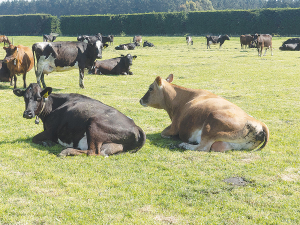Low-footprint feed drives high-profit, low-emissions dairy
The key to a dairy system that generates high profit with a low emissions intensity is using low footprint feed, says Fonterra program manager on-farm excellence, Louise Cook.
 Lincoln University Dairy Farm will tweak some of its management practices following an animal welfare complaint.
Lincoln University Dairy Farm will tweak some of its management practices following an animal welfare complaint.
Lincoln University Dairy Farm will be tweaking some management practices after an animal welfare complaint laid in mid-August, despite the Ministry for Primary Industries (MPI) investigation into the complaint finding no cause for action.
SAFE (Save Animals from Exploitation) claimed that it had seen animals standing in mud, calves piled on top of each other in a trailer, and a cow being chased aggressively by a worker on a quad bike.
However, a visit by an MPI inspector the day the complaint was received, August 15, found no significant concerns.
Lincoln University Professor of Farm Management Alison Bailey read a statement on the incident at the LUDF spring Focus Day this month, saying the university had worked closely with MPI and also commenced its own investigation.
“Following the visit of MPI they have confirmed both verbally and in writing that there were no significant concerns and that no action is required,” she said.
The complaint related to animals on the farm’s secondary East Block across Ellesmere Junction Road from the milking platform.
“For my own investigation, we agreed and noted the following:
“First, to improve the movement of recently calved cows, all cows that were yet to calf were moved onto the milking platform. This required us to provide extra feed, which we did.
“For the 26-27 season we will make sure that all our cows are on this platform here, nearer to the feed and handling facilities.
“We will continue to ensure compliance with Dairy NZ guidance and animal welfare requirements in relation to calves in trailers, and we continue to review our policies and procedures and associated staff training, basically, to make sure that we minimise stress to our animals and handle them with care.”
Bailey said that as a specialist land-based University with a portfolio of farms, Lincoln was dedicated to establishing, maintaining and monitoring the highest standards of animal welfare.
“We prioritise the well-being of every animal in our care. And we’re committed to upholding the standards of the New Zealand Animal Welfare act 1999.
“And we have to be, as a demonstration farm, at the forefront of animal welfare.”
Recent weather events in the Bay of Plenty, Gisborne/Tairawhiti, and Canterbury have been declared a medium-scale adverse event.
DairyNZ's chief executive Campbell Parker says the 2024/25 dairy season reinforces the importance of the dairy sector to New Zealand.
A New Zealand agribusiness helping to turn a long-standing animal welfare and waste issue into a high-value protein stream has won the Australian dairy sector's top innovator award.
OPINION: A bumper season all around.
Dairy Women's Network (DWN) has announced that Taranaki dairy farmer Nicola Bryant will join its Trust Board as an Associate Trustee.
Rural Women New Zealand (RWNZ) says it welcomes the release of a new report into pay equity.
OPINION: Staying with politics, with less than nine months to go before the general elections, there’s confusion in the Labour…
OPINION: Winston Peters' tirade against the free trade deal stitched with India may not be all political posturing by the…